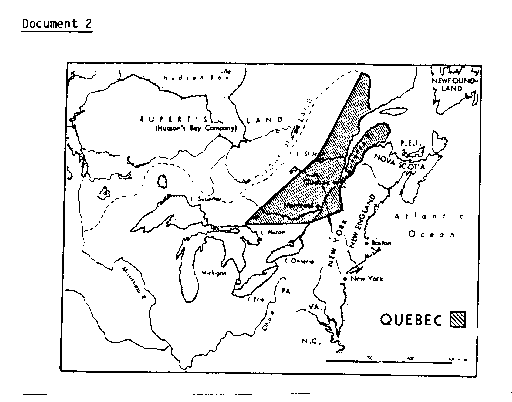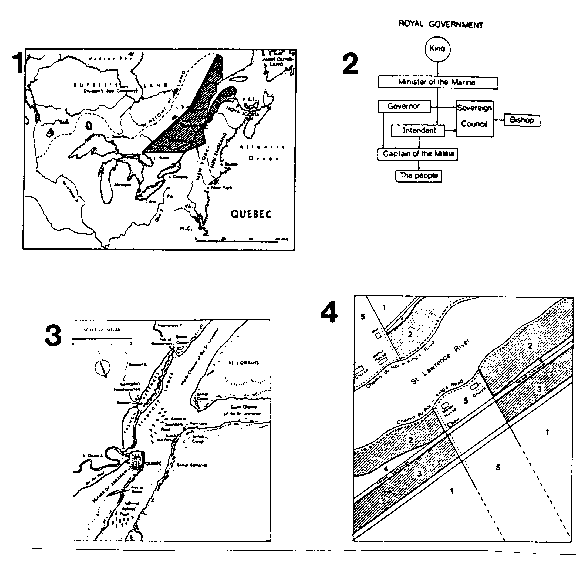
THIS TEST IS ON MODULE 3:
"THE CONQUEST AND THE START OF BRITISH RULE"
UNIT 1: THE CONQUEST
TOPIC A: THE CAUSES
TOPIC B: THE MAJOR EFFECTS OF THE CHANGES IN EMPIRE
1. In the middle of the 18th century, New France was in conflict with the Thirteen Colonies in North America. Which of the following statements give reasons for the fall of the French colony?
1. The extent of the territory of New France fostered decentralization of the government.
2. The economy of New France was based mainly on the exploitation of a single resource.
3. The economy of New France depended on that of the Thirteen Colonies.
4. New France extended over a vast area occupied by very few people.
5. New France had no army to oppose the forces of the Thirteen Colonies
A) 1 and 2
B) 2 and 4
C) 3 and 4
D) 3 and 5
2. In 1760 the fall of New France seemed inevitable considering the colony's major political, demographic, economic, and military weaknesses. Which of the following texts describes a cause of the French defeatin North America?
A - "... The colony cannot be neglected without forever losing our fisheries, a commerce of the most lucrative kind.
" - La Galissonnare
B - "The unceasing efforts we are making to befriend the Amerindians should leave them free of doubt in that regard; but since the English are behaving in a similar fashion, there is danger that these savages might well break their alliance with us." - Hocquart
C - "On the French side water was starting to run out and it became difficult to make bread. They finally succeeded in finding a tiny stream but it was not enough to quench their thirst."
D - "... Along this stretch of four thousand miles lived a French population that was insignificant in size: 65 000 inhabitants;while along an Atlantic stretch half this size the English colonies had settled a population fourteen times larger."
A)
B)
C)
D)
3. Which of the following is a factor that explains why New France was conquered by the British?
A) Compared to that of New France, the population of the British colonies was vastly superior.
B) The British controlled the entire central part of the continent, from Hudson Bay to the Gulf of Mexico.
C) The government of New France was controlled by the Catholic church
D) New France ignored the directives from France, and was left to stand on its own.
4. Which of the following texts describe causes of the British conquest of New France?
1. England supported its colonies and sent massive aid in the form of materials and soldiers.
2. The relatively small French population of about 70 000 was scattered over a vast territory.Restricted to the Atlantic coast by geographic conditions which blocked the movement of the settlers, the English colonies boasted a population of 1 600 000.
3. "Encouraged by rumours of an eventual attempt by the French to recapture Quebec, Pontiac crisscrossed the Detroit area in order to rally the neighbouring tribes to his cause ... In less than six weeks, eight forts fell to the Amerindians."
4. (The British merchants established themselves in the St. Lawrence Valley.)"They were driven by the same motives: to make quick profits, take control of the fur trade, and establish a stranglehold on political power."
5. "On the French side, ... water was starting to run out and it became difficult to make bread. They finally succeeded in finding a tiny stream ...but it was not enough to quench their thirst."
A) 1 and 2
B) 1 and 3
C) 2 and 4
D) 4 and 5
5. Several factors led to the defeat of New France. Which of the following elements contributed to the fall of the
French Regime?
DEMOGRAPHY
1. small population
2. large population
TERRITORY
3. small in size
4. very large in size
MILITARY PERSONNEL
5. small force
6. large force
A) 1, 3, and 6
B) 1, 4, and 5
C) 2, 3, and 5
D) 2, 4, and 6
6. In the middle of the 18th century, two empires came into conflict with one another in North America.
Which two of the following statements explain the FALL OF NEW FRANCE?
1. The extent of New France's territory favoured the decentralization of the government.
2. The economy of New France was based on the exploitation of a single resource: furs.
3. The economy of New France was dependent on that of the Thirteen Colonies.
4. New France extended over a vast territory occupied by very few people.
5. New France had no army to oppose the forces of the Thirteen Colonies.
A) 1 and 2
B) 2 and 4
C) 3 and 4
D) 3 and 5
7. Soon after the Conquest, the British authorities decreed the Royal Proclamation and sent precise instructions to Governor Murray. Through the imposition of these measures the British hoped that the French Catholics of the Province of Quebec would:
1. become Protestant and a minority
2. rebel against the authority of the Church
3. acquire responsible government
4. accept English laws and language
5. move out of the territory
A) 1 and 2
B) 1 and 4
C) 2 and 3
D) 4 and 5
8. With what period of Canada's history are the two following documents associated?
1." The vain illusions of a return to France quickly vanished.Hot on the heels of the administrators and military officials who had already returned to France, the more fortunate, especially the merchants,followed suit and returned to France. From that point on goods would come from England. No longer having control over commerce, they chose to leave Canada."

A) 1744-1760
B) 1760-1774
C) 1774-1791
D) 1791-1805
9. Which of the following documents illustrate aspects of the change in empires following the British takeover of New France in the early 1760's?
1. (map)
2. (chart)
3. (map)
4. (map)
5. By the terms of the Treaty of Paris relevant to North America,France gave up all claims to Canada, Cape Breton and Acadia. France transferred the possession of Louisiana to Spain; Britain gained Florida. France was given the islands of St. Pierre and Miquelon which were to be unfortified fishing stations, and fishing rights off the shores of Newfoundland.
A) 1 and 3
B) 1 and 5
C) 2 and 4
D) 3 and 5

10. In 1760 the French forces in North America surrendered to the British.In 1763 Britain and France signed the Treaty of Paris which officially ended the Seven Years' War.Which of the following illustrates one of the consequences of the Treaty of Paris?
A) Unrest in Quebec continued to grow. They did not want to bear the cost of Britain's war debts nor pay to keep a British army in America.
B) "To compensate for the loss of the peninsula [Nova Scotia], France established herself firmly on the two islands of Ile Royale (Cape Breton)and Ile Saint Jean (Prince Edward Island)."
11. With what period of our history is the following text associated? "For the 'Canadiens,' this change of empires began a new phase of their history. England now controled their future. London wasted no time in making its intentions known through the Royal Proclamation."
A) 1744 - 1760
B) 1760 - 1774
C) 1774 - 1791
D) 1791 - 1805
12. During the eighteenth century, France and England were in conflict.The Conquest of New France was one of the consequence of this conflict.Which letter on the time line indicates the period during which Canada became part of the British Empire?
A) 1700 - 1725
B) 1725 - 1750
C) 1750 - 1775
D) 1775 - 1800
13. The change in empire altered life in the colony. Some aspects of life changed for the 'Canadiens' while others remained the same. Which of the following statements describe changes that took place?
1. The colony was dependent on a mother country.
2. Furs were the primary export.
3. Criminal law was based on the English system.
4. The colony's territory was limited to the St. Lawrence Valley.
5. Most of the people were farmers.
A) 1 and 2
B) 1 and 3
C) 3 and 4
D) 4 and 5
14. The Treaty of Paris and the Royal Proclamation confirmed in law THE BRITISH CONQUEST OF NEW FRANCE. French Canadians had no choice but to accept this situation. Which of the following periods corresponds to the period in which this change of empire took place?
A) 1725 - 1750
B) 1750 - 1775
C) 1775 - 1800
D) 1800 - 1825
THIS TEST IS ON MODULE 3:
"THE CONQUEST AND THE START OF BRITISH RULE"
UNIT 1: THE CONQUEST
TOPIC A: THE CAUSES
TOPIC B: THE MAJOR EFFECTS OF THE CHANGES IN EMPIRE
1. Ans: B Diff.: 3 Page: 89-1-7 Refer To:
Topic: THE CAUSES 1A
File: mod3unit1 .........1
2. Ans: D Diff.: 3 Page: 89-6-6 Refer To:
Topic: THE CAUSES 1A
File: mod3unit1 .........2
3. Ans: A Diff.: 3 Page: 90-1-12 Refer To:
Topic: THE CAUSES 1A
File: mod3unit1 .........3
4. Ans: A Diff.: 3 Page: 90-6-9 Refer To:
Topic: THE CAUSES 1A
File: mod3unit1 .........4
5. Ans: B Diff.: 3 Page: 91-6-8 Refer To:
Topic: THE CAUSES 1A
File: mod3unit1 .........5
6. Ans: B Diff.: 3 Page: 91-8-6 Refer To:
Topic: THE CAUSES 1A
File: mod3unit1 .........6
7. Ans: B Diff.: 3 Page: 89-1-8 Refer To:
Topic: THE EFFECTS 1B
File: mod3unit1 .........7
8. Ans: B Diff.: 3 Page: 89-6-7 Refer To: 0301
Topic: THE EFFECTS 1B
File: mod3unit1 .........8
9. Ans: B Diff.: 3 Page: 89-8-13 Refer To: 0302
Topic: THE EFFECTS 1B
File: mod3unit1 .........9
10. Ans: A Diff.: 3 Page: 90-1-13 Refer To:
Topic: THE EFFECTS 1B
File: mod3unit1 ........10
11. Ans: B Diff.: 3 Page: 90-6-10 Refer To:
Topic: THE EFFECTS 1B
File: mod3unit1 ........11
12. Ans: C Diff.: 3 Page: 91-1-8 Refer To:
Topic: THE EFFECTS 1B
File: mod3unit1 ........12
13. Ans: C Diff.: 3 Page: 91-1-9 Refer To:
Topic: THE EFFECTS 1B
File: mod3unit1 ........13
14. Ans: B Diff.: 3 Page: 91-6-7 Refer To:
Topic: THE EFFECTS 1B
File: mod3unit1 ........14